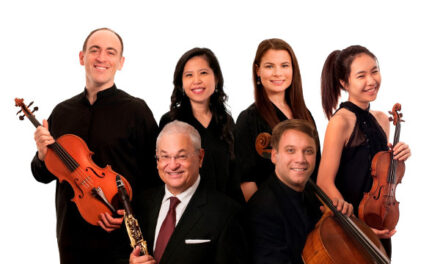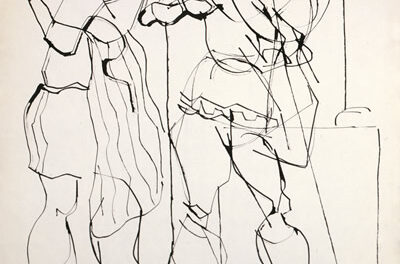It is Spring Semester and for Professor Rodney Waschka, it means introducing new students to new music. The Arts Now! Series gives the public a window into his NC State University classroom. This concert featured the world-class ensemble, Red Clay Saxophone Quartet. RCS performs a wide range of music written by celebrated twentieth and twenty-first century composers and emerging artists. As champions of new music, they are favored guests at NC State University. The members of the quartet are: Susan Fancher (soprano saxophone), Robert Faub (alto saxophone), Steven Stusek (tenor saxophone), and Mark Engebretson (baritone saxophone and composer). The program included works by Mark Engebretson, Perry Goldstein, Russell Peck, David Rakowski, Laurie Spiegel and Rodney Waschka II. The Concert took place at the Kennedy-McIlwee Studio Theatre.
The quartet opened with Perry Goldstein’s “Motherless Child Variations” (2002). It’s a stunning composition and the quartet drew a wide variety of styles from the score. There were moments when they captured the southern blues quality sending shivers up my spine. Dissonant “shouts” underscore the sadness and pain. But I also heard some playful New Orleans style jazz riffs and a bit of contemporary-sounding counterpoint. The final variation, a “straightforward and passionate rendition,” is sweet as molasses. I loved the vocal quality of their playing. In her final “amen,” Susan Fancher made her instrument cry out and sing. Another piece based on a British traditional hymn, “O Waly, Waly Variations” (1999) by Ben Johnston is one of the ensemble’s favorites. Surprisingly, the simplicity of the last variation reminded me of American shape-note singing.
Mark Engebretson’s funny The Difficulties is scored for baritone saxophone, reciter, and interactive electronics with text by Brian Lampkin. The poetry, handily delivered by Engebretson, alludes to the follies of technology. In turn, the saxophone player ‘talks’ to a laptop programmed to jam along. Their musical jabber made me completely sympathetic to the human speaker. Engebretson’s delivery was so clear and convincing that projecting the text on a screen seemed to be unnecessary.
Between pieces, Professor Waschka spun a couple of CDs. Two of the compositions were created by one of the pioneers of electronic music during the 70s at Bell Labs, Laurie Spiegel. “Finding Voice” (1989) and “The Hollows” (1990) might have shocked audiences twenty years ago. But that was never her intention. Like most enterprising composers, she uses digital technology, just as she used analog; in service of her imagination. I find her music beautiful and accessible. Rodney Waschka II creates music with compositional algorithms. He paired two of his works: “Still Life with Castanets” (2001) and “La Verdad” (2006). Spinning small bits of information into an infinite number of sound possibilities, Waschka makes otherworldly sounds from the mundane. The latter piece is created mostly from the single Spanish word, “digame” (tell me). What really fascinates me, besides the process, is the composer’s ability to conjure up deep meaning out of digitally transformed information.
Red Clay Saxophone Quartet also performed two movements from David Rakowski’s Compass (2010) and Drastic Measures (1976) by Russell Peck (1945-2009). Their performance was exceptional.












